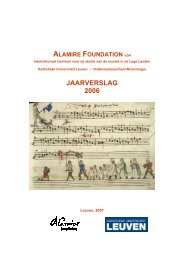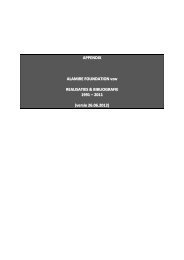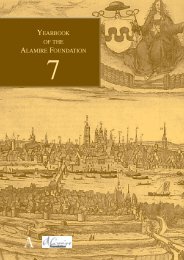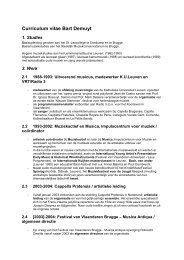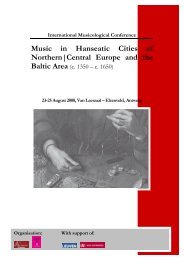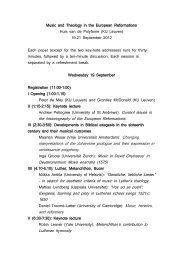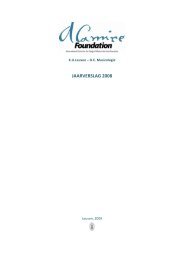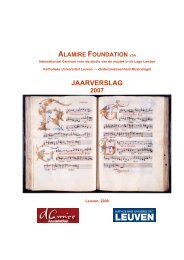YEARBOOK OF THE ALAMIRE FOUNDATION
YEARBOOK OF THE ALAMIRE FOUNDATION
YEARBOOK OF THE ALAMIRE FOUNDATION
You also want an ePaper? Increase the reach of your titles
YUMPU automatically turns print PDFs into web optimized ePapers that Google loves.
164 RICHARD FREEDMAN<br />
It seems likely, as James Haar has recently observed, that Charles IX granted this<br />
authorial privilege thinking that it offered Lasso an enticement to leave his permanent<br />
post at the Bavarian court and come to France to accept a lucrative position with<br />
the French royal establishment. 9 But the chief effect of his proclamation was to reinforce<br />
the independence of composer and printer from the royal household. Now free<br />
to choose whichever printer he saw fit – no matter that the obvious choice was also<br />
the royal favorite Le Roy – Lasso could assume a new level of control over the distribution<br />
of his music without ever leaving the comforts of Munich. In Imperial lands<br />
also, Lasso later astutely sought (and in 1581 was granted) a special privilege of<br />
authority over publication of his music there, thanks in part to the intercession of his<br />
Bavarian patron with Emperor Rudolph II. 10 Soon thereafter Lasso’s old Munich publisher,<br />
Adam Berg, sought to prevent the composer’s new partner in Nuremberg,<br />
Catherina Gerlach, from issuing music on the grounds that Berg had exclusive right<br />
to print those pieces that Lasso had sold him under a previous commercial privilege<br />
held by the publisher (see Appendix, Document 5); Berg, however, did not prevail in<br />
this instance, as Imperial magistrates ruled that the new authorial privilege allowed<br />
Lasso to reassign printing rights, regardless of the previous sale. 11<br />
Lasso’s authorial privilege represents a remarkable moment in the history of<br />
French music printing. We should recall, of course, that French privileges originated<br />
as a form of commercial protection for printers rather than a means of authorial control.<br />
No composer before Lasso had even been offered an official voice in the distribution<br />
of his creative work in France. As early as 1531 the Parisian printer Pierre<br />
Attaingnant enjoyed a monopolistic privilege from King François I that protected<br />
confirmation of 1575 was itself confirmed again in 1582 (apparently on the anniversary of the original<br />
1571 privilege). An excerpt from this document appears in Ieremiae. Prophetae devotissimae<br />
lamentationes, una cum passione domini dominicae palmarum, quinque vocum. Auctore Orlando Lasso<br />
(1586); see Document 4 for a transcription and translation of the version printed starting in 1577.<br />
Curiously, the other volumes brought out by Le Roy et Ballard and devoted exclusively to works by<br />
Lasso nevertheless print either Le Roy’s old general privilege of 1567 (see above), or make very brief<br />
allusion (on the title pages) to a royal privilege (avec privilege du Roy pour dix ans or Cum privilegio<br />
Regis ad decennium) without further explanation. The two privileges – the one for the author, the other<br />
for the printer – never appear together in the same print, but they do seem to have coexisted, even<br />
among the Lasso–Le Roy collaborations. Some, but not all of the privilege documents are cited and<br />
quoted in LEUCHTMANN, Orlando di Lasso, 1, pp. 53 and 158; H. POHLMANN, Frühgeschichte<br />
des musikalischen Urheberrechts, Basel, 1962, p. 270; and BOETTICHER, Orlando di Lasso, 1, p.<br />
481. Lesure makes only passing reference to the general and special authorial privileges.<br />
9 See J. HAAR, Orlando di Lasso, Composer and Print Entrepeneur, in K. VAN ORDEN ed., Music<br />
and the Cultures of Print, New York, 2000, pp. 134–135.<br />
10 The Imperial decree and its effect is considered in POHLMANN, Frühgeschichte des musikalischen<br />
Urheberrechts, pp. 164–165 and 203–205; and in LEUCHTMANN, Orlando di Lasso, 1, pp. 194–196.<br />
Further on the relations of the Berg and Gerlach firms, see S. JACKSON, Berg and Neuber: Music<br />
Printers in Sixteenth-Century Nuremberg, Ph.D. diss., City University of New York, 1998.<br />
11 Further on the story of Lasso’s Imperial privilege, see R. OETTINGER, Berg vs. Gerlach: Orlando di<br />
Lasso’s Imperial Printing Privilege of 1581, in Fontes Artis Musicae, 51/1 (2004), in press.



